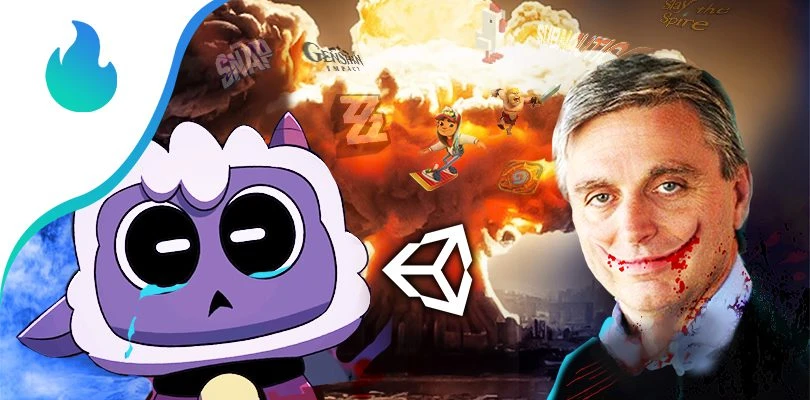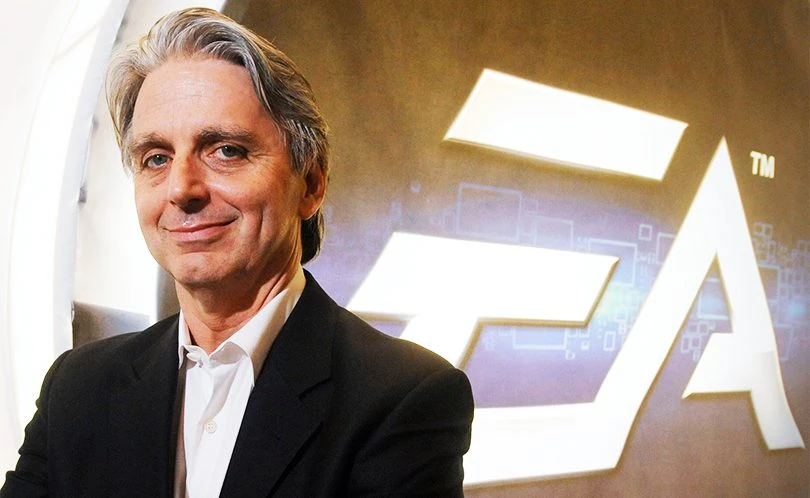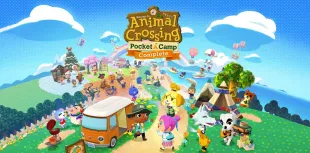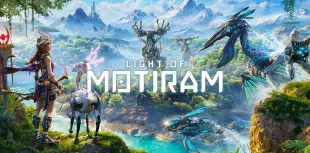
Why Unity will RUIN your VIDEO GAMES...
Studios in danger, games taken out of circulation, the FBI, maximum greed and the end of an era for PC, console and mobile gaming. The gaming industry panics over the Unity drama and its Runtime Fee. Twitter is ablaze and the future of the games you love and the ones you wish you'd discovered is in jeopardy. Let's take a look at the Unity Technologies affair that's shaking up the gaming world. Where did it come from, where is it going, why is there so much drama and what does it mean for us, the gamers? Here's the lowdown.
Find all our sources in this document. I'd like to take this opportunity to make a little disclaimer about the fact that this information changes quite a bit over time due to modifications to the Unity blog and various declarations.
Welcome to the history and drama of Unity Technologies, its past, present and future: a disaster that could ruin your video games.
THE GENESIS
Almost 20 years back in time. Welcome to the past. The year is 2004. The company that would later become Unity Technologies officially launches its business. Over the next decade, it would produce a game engine that would become the cornerstone of a huge proportion of video game creations: the Unity Engine. A powerful game engine, not only technologically, but also in human terms, with a larger and more relentless community than anywhere else, capable of giving birth to nuggets such as Cuphead, Monument Valley, Hollow Knight, The Outer Wilds, Rust, Escape from Tarkov, Ape Out, Valheim and Crossy Road from a simple idea and a great deal of motivation.

This is surely the best time to define what a game engine is. Wikipedia defines a game engine as follows.
A game engine is a set of software components that perform the geometry and physics calculations used in video games.
Wikipedia
Basically, it's a program that you install on your PC and which contains different blocks of functionality, ranging from 2D and 3D graphics display to sound effects management and gameplay development. It's a software program that provides a framework for creating and architecting games by connecting a whole host of elements. Some are more complete than others, and Unity is one of the most important in the video game industry, with a wide range of tools. In addition to graphics rendering, the engine integrates physics management, animation, AI and even 3D object modeling. It's a veritable sandbox for video game studios, who invest time and money to make it ever more powerful and boost the production of their future video games.
In the case of Unity, future games range from Genshin Impact Subnautica, Pokémon GO, Hearthstone and Among Us. You should know that Unity is not the only game engine available. There are plenty of others. In fact, you're probably familiar with at least one of its competitors, such as Unreal Engine, Godot or even RPG Maker, among many other smaller players in the industry. So why is Unity so important? Because it's the engine with the most impressive community, worthy of a Reddit of game creation.

It's the most accessible game engine for beginners, taught in schools, used in game jams, but also powerful enough to produce games capable of rivaling the biggest. With the slightest change, all strata of the video game industry are affected, from small independent hobbyists to triple-A studios. Despite its shortcomings, Unity is used to create great games and enjoys the almost unconditional support of many creators. Hold on to that sentence, because it's going to age very badly by the end of this article.
THE START OF TROUBLE
Almost 10 years have passed since 2004, and one success follows another. One of the main characters in our story is about to enter the scene. It's 2012 and 2013. Ah 2012 and 2013... the two superb years that saw Electronic Arts consecutively voted America's worst company. It's always nice to see a double like that. A nice trophy to put on your mantelpiece, especially when your name is John Riccitiello, EA's CEO at the time, and a man at the center of our history. If his face doesn't inspire confidence, that's normal.

That smile was the start of the trouble. A year later, in 2014, the famous John Riccitiello changes jobs and becomes, I'll give you that... CEO of Unity Technologies, a company in dire need of a big shark to boost its not aggressive enough business practices. Let the fun begin. We're getting closer to the Unity drama. It's now 2015. The year the world learns of the existence of water on Mars, thanks to NASA. The year when Unity goes from being a simple video game engine to a dual activity as an advertising agency and in-game vendor. Unity Technologies smartly expands into mobile game creation, sniffing out an El Dorado.
It now offers integrated ads, integrated purchases and integrated promotional campaigns, Unity Ads, which you'll find everywhere on your phones. Ads are invading our pocket screens. And even modest developers are starting to make a living from them. It's the beginning of a golden age of mobile gaming and the rise of advertising. À. Every. Session.
THE MILESTONE YEAR: 2020
Here we are in 2020. This is the year the world discovers what it's like to get a shot of the apocalypse with a reminder every 6 months. Containment and pandemics shake the world. And all the while, Unity takes off. Everyone consumes video games. With Unity, everyone can also CREATE a video game. John Riccitiello will be able to shine by securing Unity'sIPO. With the IPO in September 2020, the company is now on the dark side of strength. The teams of passionate developers are now led by hedge fund investors, specialists in financial structuring and purse snatching.
They represent 11 of the 13 members of the Board of Directors, and therefore almost all the decision-making power. The more the years go by, the more the studios and enthusiasts who use Unity wonder why the features they've been waiting for never arrive. The game engine community remains tight-knit, supporting the software despite the widening gap with its competitor, Unreal Engine, whose growth seems unstoppable.
In October, a company called IronSource, which later merged with Unity Technologies, rolled out its LevelPlay service, a suite of tools dedicated to monetizing video games in the form of an advertising network. Thanks to LevelPlay, in-game advertising auctions become ever faster and more aggressive. In 2022, Unity Technologies seems at last to remember that its community expects to be listened to and its old promises kept. An initiative is born around the game engine: the Gigaya project. Gigaya is a wonderful project, created in-house at Unity, which will enable developers from all studios to learn how to use the Unity Engine properly, with a complete game and detailed functionalities. It's a miracle and a big hype in the game-making community.
The project was cancelled in July 2022, less than 4 months after its announcement. At the same time, Ironsource merged with Unity, which became linked to LevelPlay and its ad bidding system.
Phew. You've got all the context. It's high time we got to the heart of the matter. Believe me, we're going to get worse and worse, so stick around until the end to understand the scale of the catastrophe. The Unity Runtime Fee, the scourge of Twitter, Reddit and video games. A subject that could bring ruin to the games you love, their developers and even your love of gaming. An aberration on every level.
THE FEE RUNTIME
Between 2004 and the present day, Unity Technologies has made a name for itself on the market. Its game engine is said to be used for around 70% of mobile games, i.e. the overwhelming majority, but also a large proportion of games on all platforms combined. On Steam, for example, we find some figures that can be combined with those ofitch.io, another platform for publishing games, especially independent titles. We note that a very large number of games are based on the Unity engine.
Start-up screen shows nothing
By the way, if you thought that only games with a "Unity" screen at start-up were made with the Unity game engine, you're wrong. You can't recognize them at a glance. Only the 100% free version, dedicated to students and hobbyists, doesn't let you customize the start-up screen. Try Crossy Road, for example, or Magic The Gathering Arena. Nothing indicates that they are made with Unity. And yet they are. So it's easy to imagine that a major change at Unity would affect a huge part of the video game market, and could cause a general collapse of studios and the balance of the industry in the event of a stupid decision.
Runtime Fee announced for September 12, 2023
I've seen a lot of stupid decisions in my life. But you don't come across them every day. The prize for the 2023 bullet in the foot, coupled with an avalanche of bullshit, immediately goes to Unity, winner of an almost uncategorizable category, thanks to its announcement on... September 12, 2023: that of the catastrophic Runtime Fee. According to this decision, from January 1, 2024, any developer or studio meeting certain statistical criteria will have to pay Unity a fee of up to 20 cents per game installation. À. Each. Installation.
As a gamer, what's the difference? If, like me, your brain has skipped over this info in "OK, so what?" mode, it's because you need to dig a little beneath the varnish to discover the pile of pink-painted dung hidden beneath. Let's start with a simple example:
- To meet the minimum criteria, I have to obtain 200,000 installations since the launch of my game and I have to have earned at least $200,000 in revenue over the year. Please note that I'm talking about sales, not profits. In sales, you have to deduct salaries, creation costs, distribution platform costs like Steam, publisher costs, taxes and Unity overheads. At the end of the day, 200,000 isn't much if you take all that out, so you're probably left with between $10 and $30,000 if you've managed your income well and haven't done any particular marketing campaign. That's just what you need to survive and reinvest in your next game.

- Let's see what happens with the Runtime fee. If I'm a developer in the first category, i.e. a modest one, with a Personal or Plus license, I'll have to pay 20 cents for each installation. The classic example of today's problem.

Let's start with a free-to-play mobile game. I'm Yaya in my bedroom, and I create a hyper-casual game like Flappy Bird, which hits 1 million downloads and $200,000 in ad revenues. It's a good return for a free game with ads, and I'm proud of myself. I turn around to see the shadow of Unity Technologies, behind me, holding out its hand and asking for its brand new Runtime Fee, which came out of nowhere one fine day in September 2023. I pull out my calculator with my $200,000 income and I owe him exactly... $200,000.
Yes, yes, it's the same amount. You're not dreaming. Even without any production costs, I'd have to give Unity my entire income. And in the event that Unity let me keep my first $200,000, every dollar more with the same return as at the beginning would disappear from my pocket before I could even touch it. You may be starting to see why video game developers have been asking Unity to learn how to use Excel properly to do their calculations. Unity responded in a Q&A, but did not at all clarify the big outstanding question marks around the runtime fee.
That's when Twitter and Reddit caught fire.
Madness on social networks, a tsunami of studios and disappointed gamers
Developers big and small, handsome and naughty, all agreed to reject the Runtime Fee Unity in its entirety. Entire screens of salt-and-tear-filled public statements poured onto social networks, each studio bringing its disappointment to the Arc de l'Antitriomphe.
Stop the stink @unity pic.twitter.com/ijme9wQ89m
- Massive Monster 🙏🐑 (@MassiveMonster) September 13, 2023
👋 @unity pic.twitter.com/mBCfb8li3z
- Mega Crit (@MegaCrit) September 13, 2023
Behind each of these images are people full of disappointments, existential fears and so on. These people are not just a bit of text on social media, you owe your current existence to them @unity. You abuse their trust for your greed. Shame on you.#StopTheGreedUnity pic.twitter.com/3Adf37Voga
- Game Studios Disappointed By Unity (@FuckedByUnity) September 15, 2023
The people are calling for the head of John Riccitiello and part of the board of directors. But the more questions people ask, the bigger the problem gets. Each case becomes worse than the last. It' s a cacatastrophe. People imagine every possible situation. But what if...
- Does the Runtime Fee represent more than 100% of my income? Am I going into debt offering a game I've created?
- What if these people install my premium game illegally? Technically, I'm not making a sale. Yet I have to pay for the installation? For Monument Valley, for example, the game's piracy rate on Android is 95% and, like the others, it's a Unity game.
- What if my game is available for free in Game Pass. Will I have to pay for free installations?
- What if someone installs and reinstalls my game?
- And if and if and if... Each tweet raises the tension like a pressure cooker. Some refuse to believe it. Others announce that their lives are over, that their studio will sink or that it may be years before they can release a game again, far from the Unity engine.
You may be wondering if there's been any good old Twitter overreacting, exaggerated toxicity or misinterpretation. I'd like to say yes. Yet Unity's subsequent answers to all these questions have finished convincing the world that this company has decided to sink them in order to suck their petty profits to the bone, to the detriment of video game studios and gamers the world over. But there are many other reasons for all this drama.
INCOMPREHENSIBLE DECISIONS
Firstly, the Runtime Fee is retroactive. This means that even games published before January 1, 2024 will be affected by this decision, and will have to pay Unity pennies based on their installations from that date onwards. This is rather surprising, since common sense generally dictates that game engines like Unity should allow their users to use the current version of the software unchanged, and only force them to follow their new rules when they upgrade to the latest version of the software, which also follows the most recent rules.
Digging a little deeper, this story gets even murkier. In fact, between June 2022 and April 2023, Unity discreetly made changes to its terms and conditions of use for the game engine. They also removed the Git repository, i.e. the page used to track modifications. Once out of sight of the community, they were able to remove the clause that allowed developers to use the current version of their game engine without applying new monetization policies if it harmed their business. And yes, before all this, this drama wouldn't really have happened! Developers could have stayed with the current engine, without upgrading, and left Unity at their own pace if the business model didn't suit them going forward.
Starting to see why it's shady? The order of things is simply not trivial. We could have seen it coming. Right now, all games made under Unity in the past are going to be affected by this completely arbitrary decision. Unity Technologies has given itself the right to change the rules of the game as it goes along, and even to affect the past. How can you trust a company like that, which can decide overnight that you owe it 50% or more of your revenue? Imagine if Photoshop decided to tax you 20 cents per print of your image on the web, or if the car manufacturer decided that you now owed it 20 cents per kilometer as of January 1, 2024, without asking your opinion.
So where does this story about Runtime Fee installations come from? On closer inspection, this statistic appears to be completely out of the hat for much of the industry. Installations" only exist as a metric for mobile games, which count their number of downloads. The rest of the industry focuses on sales figures and time spent in-game, the major aspects of audience conversion and retention. Installations are not a predictable number, and they don't generate money. You can buy a game and never download it if, like me, you store several hundred titles on Steam.
On the other hand, you can also download a game and never have bought it, for example by recovering a pirate version. So why is Unity concentrating on installations? In fact, the company loses a lot of money every year. It invests heavily in buyouts and board bonuses **cough cough**. Developers and gamers imagine that Unity is first and foremost a game engine, with ads and monetization in the background. But the opposite is true. In terms of revenues and decisions, this has been further reinforced by the merger with IronSource. The Creative Solution branch of Unity Technologies, which contains the game engine, generated $326m against $709m for the branch dedicated to advertising and monetization on their 2021 financial report. Unity is a monetization machine with in-game purchases, ads and bids for advertisers. In fact, Unity would like to get more money from mobile games, especially free-to-play titles, to scale its revenues.
Obviously, the snowball effect is that with such a rotten measure, it's going to push all the games to vampire you to get more and more money, even those who didn't want to do it before, to survive and make a minimum of profit. The more you look, the more you end up making the wrong decisions. After a few clarifications, Unity declares that reinstallations on the same device will not be taken into account, nor piracy. Yet it would be easy enough for any developer to open a whole bunch of virtual machines with a bot to install the game and sink their competition just like that. And how does Unity count these installations? Unity's answer:
We operate our own data model, so you'll understand if we don't go into too much detail, but we believe it offers an accurate assessment of the number [of installations] for a given project.
FAQ Unity
I'm translating this into common language. We've got a solution we're working on, which isn't ready, but we think it'll be fine, so "trust me bro".
Not only do developers have no visibility over installation figures, and therefore no leverage to challenge them in the event of massive piracy or an ultra-salary bill, but Unity also takes the liberty of charging what they think studios owe them. If you allow someone to charge you an imaginary number without any proof, you're out of your mind. Unity even declares that web games will owe the Runtime Fee every time the page they're running on loads, before backtracking on September 13, in the midst of the massacre. For the rest, reinstallations are not counted, nor are bundle sales, but installations on multiple devices are. So you can still sink a competitor with emulators, machines and clouds etc.
Non-game applications, i.e. gambling or association-related, are also excluded from this new installation policy. However, Unity reserves the right to impose the Runtime Fee if it doesn't consider your association to be legitimate, for example. Great. Meanwhile, everyone wants John Riccitiello's head.
The company also clarifies in its Q&A that games published via subscription systems such as Microsoft Game Pass, Netflix games or Apple Arcade will not need to pay for Runtime. No.
Instead, it will be Microsoft, Netflix or Apple's turn to pay for the installations. I can already tell you that contracts between major publishers and Unity developers have already been cancelled this week just before they were signed because of this announcement. Publishing giants will have no interest in dragging their feet with Unity games. Either they'll ignore them royally, or they'll offer them the most disadvantageous deals possible to compensate for the Runtime Fee. Or Unity is going to get its ass handed to it with a nice lawsuit. The choice is yours.
I'm not even talking about Steam family library sharing, which wasn't really mentioned, but which could multiply the number of installations per number of purchases. Honestly, nobody understands Unity Technologies' decision. The communication is messy, slick and incomprehensible. The announcement itself is so vague that any scenario becomes a catastrophe. And the off-the-cuff answers to major questions are sowing panic among developers. But in addition to the Runtime Fee, another change has crept into this September 12, 2023 announcement: the disappearance of Unity Plus, a formula tailored to smaller developers.

Instead, people will now have to fall back on the free version or pay $2,000 per year, per person to use Unity. Not to mention the Runtime Fee, which means that small studios who want to take advantage of cross-platform features, for example, have to pay 5 times more than before. By way of comparison, Unreal Engine takes 5% of revenues after $1 million. John Riccitiello has done a good job of boosting Unity's profits at the expense of the smaller players. A petition has been set up to remove him from power. But he's not alone at the helm.
Johnny and friends: the Riccitiello bubble
We enter muddy territory. Here we are in the heart of the capitalist jungle, with Johnny and his friends. In 2011 at EA, at an investors' meeting, John Riccitiello lifts the mask:
When you've been playing Battlefield for 6 hours, run out of ammo and are asked for a dollar to reload your weapon, you don't pay too much attention to the price at the time. So what happens, and this is why the game first, pay later model works well, is that a consumer gets involved in a license. They may spend 10, 20, 30, 50 hours on a game. And then, when he's deep into a game, he's really invested. At that point, the level of commitment can be high. It's a great model that represents a much brighter future for the industry.
John Riccitiello, 2011
The full audio extract is available here.
Ah, you said it, Johnny. Paying to reload my gun in the middle of a fight with microtransactions based on my frustration... It really is the dream. No need to get carried away, it's just an example for John Riccitiello. But remember that this is exactly what video game bosses say to their investors, and that they'll never say to gamers' faces. At Unity, this is reflected in the presence on the board of directors of :
- Tomer Bar Zeev
- Roelof Botha
- and Egon Durban, for example, all closely involved with hedge funds and therefore used to behaving like vultures. So why not turn Unity into a carcass for good, with drama, a runtime fee and maximum destruction?

We follow up with a crunchy new quote from John Riccitiello in 2015, at Unity.
You get all the power of Unity 5 for free. No royalties, no scams. It's simple. And that's really what we're advertising.
John Riccitiello, 2015
Simple. It's the perfect opposite of the Runtime Fee Unity, the drama and magnificent bullshit we've been treated to since September 12. But John isn't afraid of free-to-play models that turn exploitative , since he's also reportedly a whale on some mobile games like Clash of Clans, on which he's said to have spent over $3,000, even if for him it's pocket money.
You could say that royalties are a bit like free-to-play. They get you hooked, and then they try to exploit that relationship. That's not what we're trying to do.
**cough** Runtime Fee **cough**.
Well, here's another sentence that has aged very badly. We could confront Johnny and his friends with their contradictions in a 40-minute video, but I'm going to end Saint John Riccitiello's speech anyway with this quote that perfectly describes the arbitrary, unilateral and destructive decision for all developers who are members of the Unity community of the Runtime Fee:
Unity's fundamental philosophy is democracy.
Johnny Riccitiello
Azure Games' open letter
On September 14, in the midst of the drama, Unity Technologies was "forced and coerced" by a "credible" death threat to close its Austin and San Francisco offices and cancel a meeting to discuss the future of the new economic policy problem. The FBI and local authorities get involved. Little twist. The death threat actually comes from within, from an employee at Unity Technologies. It's an all-out meltdown.
On September 15, the gaming community saw the rise of discontent as Unity played dead. Radio silence for John Riccitiello. Developers, on the other hand, are speaking out. An open letter from a number of studios on the Azure Games website reads:
As stakeholders, we cannot remain silent when a decision threatens to unbalance this ecosystem. To claim, as Unity did, that this new "Runtime Fee " will affect only 10% of the industry is not just misleading, it's clearly deceptive. While we've always seen our work as a collective effort, this decision has caught us off guard. With the stroke of a pen, you've put hundreds of studios at risk, without consultation or dialogue. This is not just about developers. It affects artists, designers, marketers and producers. It's a cascade that could lead to the closure of companies that have given everything to this industry.
Azure Games and studios associated with this open letter
The disappointment is great for the studios and all Unity enthusiasts. The community is rumbling, but the studios still have at least one power in their hands: their revenues. The Unity company relies heavily on its mobile advertising services, as I mentioned earlier in this article. So we might as well come clean and let them know what it feels like to be held hostage for their revenues, as with the Runtime Fee. The open letter continues with an ultimatum:
Effective immediately, our collective of game development companies is forced to disable all ironSource and Unity Ads monetization across all of our projects until these changes are rethought.
Azure Games and studios associated with this open letter
We invite everyone who shares this position to do the same. The rules have changed and the stakes are far too high. The Runtime Fee is an unacceptable change to our partnership with Unity that must be rescinded immediately.
This letter was signed by over 500 studios in just a few days. They've even launched a site, unitedgamedevs, but it's offline as I write this article. After deliberately spitting on the users of its game engine, Unity is caught in its own net of drama with monetization eluding it. If the studios aren't going to get anything, they'd rather drag Unity to the grave with them and speak the only language John and his friends really listen to: that of money.
Legal issues and theories
The weekend of September 16 and 17 is being held in abominable silence from Unity, and some developers are starting to train on other game engines. With no news, it's time to turn the page. Unity declares that the Runtime Fee will affect only 10% of developers, and no one can say whether this is true. Going back over the calculations, those affected will even be able to survive overall if installations from their old users don't eclipse the revenue generated by new ones. But they have shattered the confidence of their community and the dreams of independent developers who dreamed of doing what the big boys do.
The political response to confusion...
The next generation of games has already begun to emigrate. Late on Sunday, Unity publishes a memorable tweet:
We hear you. We apologize for the confusion and anguish caused by Tuesday's Runtime Fee announcement. We're listening, discussing with our team members, customers and partners and will be making changes to this policy. We'll share a new version with you in a few days. Thank you for your honest and critical feedback.
Unity Technologies, on its X / Twitter account
Obviously, nobody liked it. Waiting 3 days for a reply that clarifies nothing and claims that people are confused when it's clearly a catastrophic move on their part, never pleases. As a result, people let loose on the Frog of Shame, which brings shame to an original post if it exceeds the number of likes of the original post.
- Opera GX (@operagxofficial) September 18, 2023
It's a win for the frog and another loss for Unity.
Is what Unity is doing with the retroactive Runtime Fee legal?
Let's move on to pragmatic questions: is what Unity is doing legal? Legal or not, it's hard to say and no lawyer can guarantee that 100%, but here are a few points that could earn Unity a few lawsuits in different parts of the world:
- Already, Unity is offering credits to avoid the Runtime Fee up to 100%, to be negotiated privately and on condition that the studio agrees to submit 100% to Unity by integrating all their monetization services in place of competitors like AppLovin. Ah, the wheeling and dealing behind the counter. They could also have asked to hold the kids hostage to make sure they kept the studios in a closed ecosystem for life, but they lacked creativity at the time. This single sentence in Unity's statement about credits to avoid the Runtime Fee poses a serious anti-competitive problem and is a direct attack on AppLovin.
- A number of studios are currently preparing a class-action suit against Unity, concerning the retroactivity of the Runtime Fee and the enormous costs they will incur if the company does not reverse its decision.
- Secondly, Unity could run into problems with certain data harvesting laws such as RGPD if they retrieve sensitive information for users in addition to installations.
- Thirdly, a number of insider trading theories have been circulating on Twitter. Johnny and his friends have been evacuating some of their shares in the company for a year now. These moves have been planned for over a year and were largely carried out in the run-up to the Runtime Fee. Unfortunately, this does not fall within the scope of insider trading, since it represents only a small portion of their shares, planned a long time ago and with no major impact on the Unity Technologies share price.
Other theories about what might happen in the days and months ahead include a number of different ideas.
- According to some, Unity may have tossed the installation fee around like a classic "we'll give you something horrible and then we'll back off on part of it, but not all of it" move. And you'll thank us because it's still not as bad as it was at the start".
- According to others, Unity may be seeking to drive down its value in order to agree to a buyout of the company by Apple at a reduced price.
- And finally, Unity is said to have released the press release as a bit of a surprise, figuring it would go down like the Reddit issue this summer.
More and more confusion with the attribution of the Fee to the "Distributor
What I can tell you is that the expression "to pull a Unity" or "faire une Unity" in French is already spreading to refer to awful partnership practices. The situation is very strange. The Unity FAQ states:
The Runtime Fee Unity will be invoiced to the entity responsible for distributing the Runtime.
FAQ Unity
That is, the executable file, the little ".exe" you're probably familiar with. Here again, it's all a blur. As far as I'm concerned, the distributor is either the publisher or the "distribution" platform such as Steam. I just don't get it. You could say I'm confused now, thanks to Unity. To try and make things clearer, someone asked Unity Muse, the company's AI, what she would think of a business model with an installation fee.
Time to find out if only humans are confused. Ah. Well,their own AI thinks it's a stupid idea. To quote her:
"The idea of implementing a pay-per-install model seems at odds with Unity's core principles and may not serve the interests of the Unity community. Such a model could lead to a fragmented ecosystem where only the most financially stable developers thrive, and potentially stifle innovation and creativity."
Unity Muse, 2023, on the subject of a possible Runtime Fee
Worst of all, the trust between developers and Unity has been broken and trampled underfoot. The Runtime Fee is unsustainable because installations are not a predictable number, which is extremely unstable for video game production and the financial maintenance of studios. Unity settles on its throne, and the others have to put up with the financial pressure because they have no other choice. They could leave, but they would lose more than a decade of expertise, tools, assets of all kinds and their entire game production structure, which would cost them enormously. However, in the long term, having Unity's knife to your throat is even less tenable. Many studios and independent developers have already made up their minds.
They're called: refugees from Unity.
Unity Refugees & the future of Runtime Fee drama
With all this drama and complicated exchanges, what does this mean for your favorite studios, your games and the gaming industry? Honestly, things are still unclear, and some of the big studios that replied to journalists' e-mails said they couldn't comment on the situation.
But a few things are already certain. The trust between Unity and the developers has been broken. Unity Technologies unveiled a game plan far darker than anyone could have suspected. They were deaf and blind to the panic they caused, far from the reality of things. For the studios, choosing Unity with or without runtime fee remains the short-term safety card, but all those who came forward confirmed that they wanted to change engine anyway, since they feel that Unity could do it again any time with an equivalent drama. Unreal Engine is a good alternative, but so is Godot, which could signal the rise of the open-source game engine.
The important thing to remember is that power is concentrated in the hands of a few players who can change direction at any time and turn the video game market upside down, be it Unity, Microsoft or Tencent. If this runtime fee exists in 2024, many games will have restarted or resumed development elsewhere, which could delay their release. Triple-A games are the first to be targeted by behind-the-counter deals, and I'm not too worried about them. But mobile gaming and small and medium-sized developers have been betrayed by Unity. They're going to have to find alternatives, which should slow down the release cycle. This will cost them time and money. And if the Runtime Fee exists as planned, you'll be able to sink studios you don't like if their games run on Unity and you know how to have fun with emulators, VMs or botting.
Conclusion: explanations and projections for the future
Runtime Fee or not, things will never be the same again. With this drama, whether Unity cancels its policy or blindly pursues its profitability targets against a backdrop of corporate announcements, developers' confidence in this giant has been shattered. The bad buzz in which the company is drowning will never be surpassed by the noise of a simple comeback. You know social networks. Developers have been taken hostage by an arbitrary decision, without any consultation, jeopardizing their creative freedom, their games and their ability to exist financially and peacefully in an increasingly competitive video game industry. Developers and studios weren't wary enough. And today, many of them are no longer willing to be fooled. No longer willing to give Unity this power over them and their players. The mobile market could suffer even more, given Unity's dominance on this medium. Despite the shock, there is hope. Unreal Engine and other game engines are ready to welcome refugees from Unity.
Some studios will surely prefer to create their own engine, since they have the skills to do so, and this could guarantee their future freedom and security.
Others, notably 2D game creators, will easily join Godot, an open source and transparent game engine made by the community, for the community.
As I've read so often on Twitter, these stories of hedge funds, profit at any price and business decisions blind to consumer reality have to stop. It's a sign that it's time to return this industry to the gamers and developers who make it happen. With great power comes great responsibility, and not everyone is up to the task. Unity Technologies is not living up to what studios and gamers deserve.
Thank you for reading this far. This is a subject that was very close to Team Mobi.gg's heart. We had to tell you about it, even if it's a bit late because we wanted to do things right. I couldn't cover everything because there was so much to see.
Feel free to post your questions, add to the information in the article or debate in the comments. At the time of finishing this article, a leak (probably intentional) indicates that Unity could propose a total levy of installation fees capped at 4% of revenues for the big studios, which won't save the smaller ones, but the company is also reportedly thinking about allowing people to track their installations themselves. Our sources are available in the document at the top of the article, and we've done our best to bring it all together in one place dedicated to our community.
To bring back... unity.
Similar articles

Release of BlueStacks Air: enjoy your favourite mobile games on the Mac M Series!
10 December 2024 is a big day for Apple gamers! BlueStacks is today unveiling its native gameplay experience for the Mac, enabling you to enjoy y...

Recap #183: Mobile game news of the week
In this week's recap #183, we take a look at the week's must-have mobile games releases, mobile news and pre-registrations/test phases not to be...

Infinity Nikki release date and time: the dress-up game is coming!
The next instalment of the Nikki licence arrives tomorrow on Android, iOS, console and PC via the Epic Game Store. We've revealed the release dat...

Release of Animal Crossing: Pocket Camp Complete, the premium version is now available!
Animal Crossing: Pocket Camp is dead, long live Animal Crossing: Pocket Camp Complete! Seven years after its F2P release, the game that closed on...

The top mobile games to try out in December 2024!
Don't know what to try out on your phone - on the move, at home or even in the toilet? Every second spent gaming has to be worthwhile, so the Mob...

Tencent announces Light of Motiram on mobile and stirs up controversy!
Tencent has announced the arrival of its next open-world survival game, Light of Motiram, on PC, PS5, Android and iOS. Since then, the gaming wor...





Leave a comment
Your email address will not be published. Required fields are marked with*.